Local historian and publisher of Cafe Unknown, Dan Haneckow, recently uncovered some interesting documents and videos about Portland’s first efforts to tame its traffic safety problems.
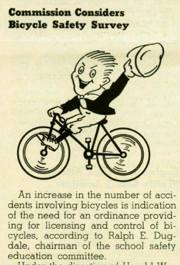
bicycle safety survey published
by the Portland Traffic Safety
Commission in 1941.
Click to enlarge
(Thanks to Dan Haneckow)
In the 1930’s, Portland experienced a fatal traffic crash once every five and-a-half days.
I came across this, and other interesting historical documents and videos via a blog run by local historian Dan Haneckow. Dan runs Cafe Unknown, which looks into Portland’s travel history. Last Saturday he shared a story about Portland’s first efforts to improve traffic safety.
The story began back in 1937 when Portland’s Traffic Engineering Bureau was established. Haneckow reports:
“As population and vehicle ownership increased, the streets of Portland were becoming more dangerous to drivers, bicyclists and pedestrians. The Bureau was established to control all matters pertaining to the design and placement of traffic signs, signals and other traffic control devices.”
As Portland grew, its increasingly busy roads took a sobering toll on human life. Haneckow uncovered stats published by the Portland Traffic Safety Commission in August of 1940 that said 900 traffic deaths had occurred from 1925-1940. Streets were particularly lethal from in the 1930’s when there was a traffic death in Portland every five and a half days.
Much like today, excessive motor vehicles speeds were a major culprit of injury and death on our roads. Check out the public service announcement below published by the Portland Traffic Safety Commission in 1940:

But despite dangers, bike use was apparently on the rise. In the fall of 1941, the Portland Traffic Safety Commission considered whether or not to create an ordinance, “providing for licensing and control of bicycles”. In a clipping found by Haneckow the Commission writes that a system of licensing bicycles would,
“provide an opportunity for police or school authorities to inspect bicycles and require each bicycle to be properly equipped with lights, good brakes, and horn or bell.”
But even with a well-equipped bike, I’m not so sure I’d want to tackle chaotic Portland traffic in the ’30’s and 40’s. Check out the video below of the bustling N. Interstate and Broadway intersection in 1939 (view is from Broadway Bridge looking northeast).
At that time, it was considered the most dangerous intersection in Portland…
For more great historical intersection viewing, check out Haneckow’s YouTube page.
Also be sure to check out the full traffic safety post on his blog, Cafe Unknown.



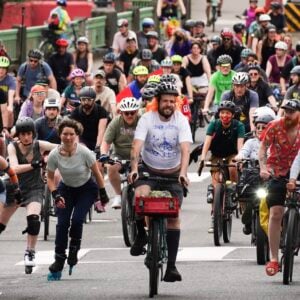
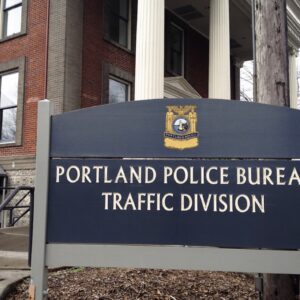
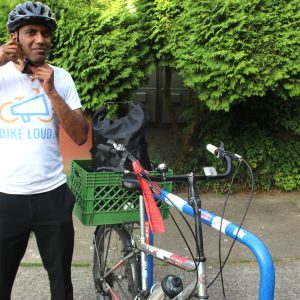
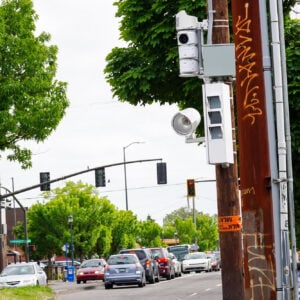
Thanks for reading.
BikePortland has served this community with independent community journalism since 2005. We rely on subscriptions from readers like you to survive. Your financial support is vital in keeping this valuable resource alive and well.
Please subscribe today to strengthen and expand our work.
oh . . . my . . . god.
That is freakin nuts!
Reminds me of Boston, but more recently.
Wowzers! I didn\’t watch every minute of all the videos, but I didn\’t see one bicycle in what I did watch. And I\’m not surprised.
These videos are pretty enlightening. We think drivers are bad today, but drivers from the \’30s were waaaay more dangerous, if this footage is any indicator. But then again, people had only been driving cars for a relatively short amount of time.
This looks like Senegal today! It may have been more dangerous, but people were probably much more aware of what was going on around them.
Thanks for the video!
The situation in this video has a lot in common with the shared space and natural traffic calming theories in urban planning.
Add bikes into the mix, and it looks a bit like this: http://www.youtube.com/watch?v=RjrEQaG5jPM, (not as fun as Portland for riding a bike, by a lot – mostly because of the horns) or maybe this: http://www.youtube.com/watch?v=21uZ0eQA35c (perhaps slightly more fun than Portland for riding a bike).
The cars in the video from 80 years ago were also for the most part harder to handle than even the monster SUVs of today.
To get Zack\’s first link to work, copy and paste it and remove the comma at the end.
I think that bike survey image is promoting riding without brakes and no helmet… What a hipster. 😉
But that video just goes to show how far we have come in urban traffic design. Its no wonder there are no bike coming over, it looks pretty sketchy to even drive through.
Fantastic post! Gives amazing perspective on the ongoing traffic safety debate!
wow!
i look at those videos, and i see awesome organically flowing traffic. get me a time machine, i would *love* to ride in this stuff. it reminds me a lot of how paris and amsterdam flow, both cities i love riding in. its an order out of chaos thing. ok, yeah, 10 years of death… but it was the 20s and 30s! people were still getting used to the whole car thing! 🙂 sure, theres a lot of crazy maneuvers and close calls, but theres something different about how the cars are behaving that i just cant put my finger on – to me, they appear to be simultaneously more cautious and more assertive – drivers look like theyre looking, but theyre just not hesitating as much as many do now. i cant put into words what gives me this impression simply from watching video of cars driving around in intersections, but there it is.
and streetcars! oh man! streetcars on the broadway bridge! downtown! streetcars everywhere, classing things up.
*and* the cars are way cooler looking, and theres this fantastic background music *everywhere*! 🙂
and not a lot of bikes to be seen, likely because of the big drop-off in adult ridership around 1918 or so, when grown-ups seemed to decide they wanted vehicles with motors, and bikes in the us became mostly childrens toys for a good 50 years.
Two bikes can be seen on the SW 6th and Morrison film.
No one in the 30s was on a cell phone, listening to loud music on the car stereo or eating a burger and fries at the wheel. I imagine people back then were enjoying driving more. It was seen as less of a mundane – \’I just have to get there in a hurry\’ – task than it is seen as today.
The bottom line today comes down to one word: \”selfishness\”.
The idea that my needs (or perceived needs) are more important than anyone else\’s leads to excessive speed, aggressive driving, impatience, frustration, hurry, hurry, hurry up; \”I need to be somewhere now and you – little cyclist, pedestrian, etc. – are in MY WAY.\”
Ron
Wow. I am so glad traffic today isn\’t like that. As I am not an adrenaline junkie, I doubt I\’d ever get on a bike.
Amen, Ron.
That video is pretty amazing, though; it does look pretty organic, and for the most part people take turns… but it would still be scary to ride, walk, or drive.
Pretty cool stuff!
The drivers had an expectation of how long each trip would take and that it would be really fast… compared to walking, riding a horse or cycling! They all seem more patient with each other and with delays. Really weird! Like that\’s how it is supposed to work!
Today the expectation is to travel without encountering very many delays, and frustration erupts when that expectation is thwarted.
Watching the videos, it reminds me of when I\’m at work, forklift and motorized pallet jack driving. Everybody knows were they are going. And where the others are going. Like I\’ve said before the 39th and Glisan circle should be yeild, not stops. I just drove threw two other circles the other day out near Forest Grove, awesome, no stoping.
Based on the video, if the cell phone had been invented in the 1930\’s, it is doubtful that humans would have survived in PDX.
Joel #9,I think I have a man crush; what you can\’t put your finger on is Spidey Sense. The sense that the ca-ca will hit the fan if I do not pay attention. I have never cycled in HamsterDam or Paris. But my experience in Italy suggests that it is similar. The realization that it not ok to kill someone just because you are in a hurry.
Better steering, brakes, seat belts, and bumpers today probably make a big difference in the severity of crashes, even for a pedestrian!